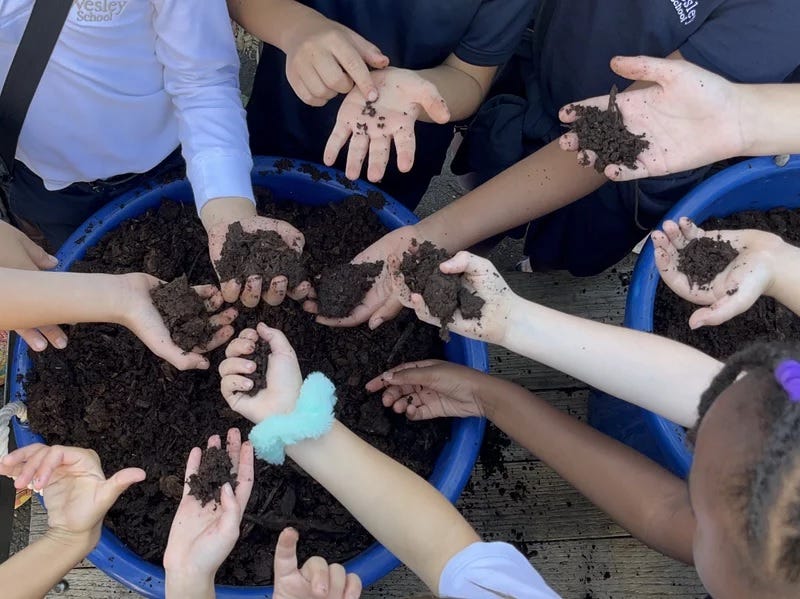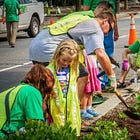LA School Helps Climate By Composting Kids! Or Something Like That
The kids do a composting project while learning about climate. That works, too.

As we’ve noted before, climate education doesn’t have to be — shouldn’t be, in fact — merely telling kids things are a crisis so they’d better clean up after every generation that came before them or we’re all DOOMED. That’s an excellent way to cause little kids to have nightmares, the way I did when I was six and took too literally a teacher’s warning that a solar eclipse could blind you if you looked at it directly. I still remember the nightmare where the eclipse was trying to get in through the closed window shades.
Ahem.
Instead, the main thing to emphasize for kids is that they can join the millions of adults who are working to help with the problem, and maybe save for high school the depressing news about how oil companies suppressed the science for decades. That’s the goal of a composting program at The Wesley School, a private K-8 school in Los Angeles, where all the leftover food from the cafeteria goes into compost bins to become rich soil, as NPR reported yesterday. Here’s a brief audio version of the story, too, because hey, we can upload audio I just figured out!
Jennifer Silverstein, a therapist, a social worker, and part of the Climate Psychology Alliance of North America, says the school's composting program checks a lot of the boxes for effective, positive climate education.
"Instead of [teaching kids] just, 'all these horrible things are happening,' it's like, 'all these horrible things are happening, and there's all these adults out there who are really actively trying to make it better. And here's ways you can participate,'" Silverstein says.
And honestly, we try to do that with our climate stuff here at Wonkette because Crom knows there’s plenty of terrible stuff out there, but so many genuinely inspiring, creative people working on decarbonizing the economy too.
The Wesley School started composting its food waste in 2022, using a composting technique developed by composting consultant Steven Wynbrandt, a farmer who works with a bunch of groups around LA to promote composting. I was surprised to see that, unlike my city composting program, the school even composts meat and dairy, so that’s even less waste going to the landfill. As NPR ‘splains, that’s
great news for the climate. Food that breaks down in a landfill produces methane – one of the most potent planet-warming gasses. But transforming organic material into compost means there's less methane going into the atmosphere.
The Wesley School staff could have easily tossed the school's food waste into a city-provided green bin. California law requires municipal food waste to be recycled. But taking it out of sight, which would have been easier, would have missed the point, says science teacher Johnna Hampton-Walker.
"When it's invisible like that, they don't see it," she says. "They know, but it doesn't sink in."
All told, the school has diverted 5,200 pounds of food waste into compost, pretty impressive for a school with about 315 students. Imagine what could be done at a big public school! That’s right: The kids would learn composting, making them ripe for Marxist indoctrination and filthy books!
In October, the school opened up the first of five big bins it started filling last year; the remaining four are still cooking up compost and the kids have made big colorful signs saying when they’ll be ready. Neato!
[The kids] pepper Wynbrandt with questions as he breaks the ties that hold the container closed: "Is it going to smell?" "What's it going to look like?" "Is it going to spill out?"
Rich black compost spills out from the container.
"It doesn't stink at all!" says one of the kids. "It smells earthy!"
And lo, the kids realized that they really had done something, like Finn, a sixth-grader who exclaimed, “That's my orange chicken in there. That's not just like any food. Somewhere in there is my food.”
Several kids, who are natural activists, started a petition to replace single-use plastic utensils with compostable ones, and we can’t see how the school has any choice but to agree.
OK, one more inspirational bit and then we’ll do the “go read the whole thing” thing:
Fifth grader Kingston was excited to learn his food waste will help grow new food on campus. "It feels good that you're doing something that helps the planet, instead of just sitting and watching it get destroyed," he says.
That's the response Wynbrandt wants. He wants to work with more schools like The Wesley School to start these composting programs. "A lot of us, especially kids, feel really overwhelmed and powerless and don't know what to do," Wynbrandt says about the climate crisis. "This is quite an existential crisis, and how do we make a difference? How do we make a dent?"
The compost is used for plants around the school’s campus, and students’ families can take some home too; if any’s left, it’s donated, passing the soil on for more growing things what take carbon dioxide out of the air.
Compost the rich!
[NPR / Wybrand Farms]
Yr Wonkette is funded entirely by reader donations. If you can, please subscribe and help us reach 5,000 paid subscribers! But if a one-time donation works better for you, that’s nifty too, and here’s your button:
If you’re shopping at Amazon anyway — for books on composting, for compostable forks, or to help Dok Zoom with his manga wish list (yes really, if you wanna) — this portal gives Yr Wonkette a commission!




AP had an article earlier this week about how having two vegetarian meals a week could help offset the actions of climate change created by the mass farming of animals. Needless to say the comments on the post (which was unfortunately on Facebook) were a litany of angry screeds about "the gubment not gonna tell me what to eat" & the ever intelligent "I like steak". The absolute bullheaded ignorance is a huge contributor to climate change.
"Compost the Rich" is going to be my new slogan.
OT: I was sick this morning and missed the more open thread attitude of the morning non-commentary, but I have something I just HAVE to share because I am just tickled shitless.
paul and I exchanged our gifts yesterday. We both received Jack Smith sweatshirts from our oldest daughter and her husband. And paul gave me the book I have been craving with every fiber of my being. I now have my own hardcover copy of Geddy Lee's autobiography, "My Effin' Life".
Okay, I'm done being pesky now.